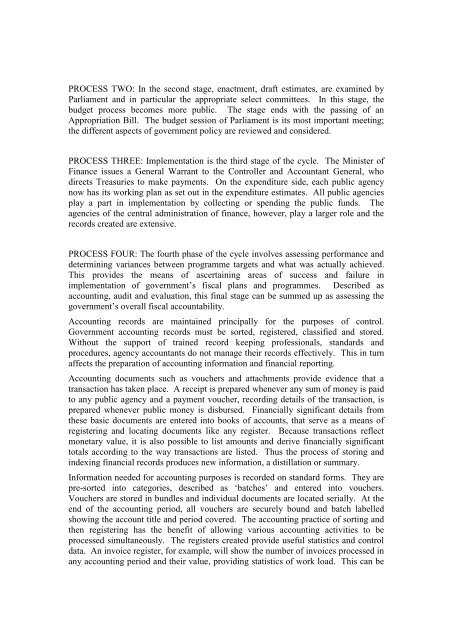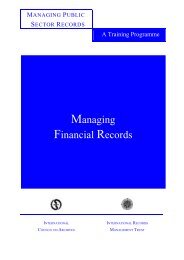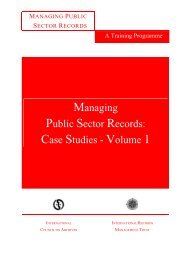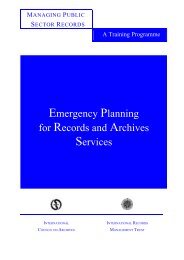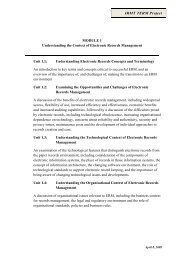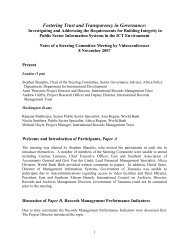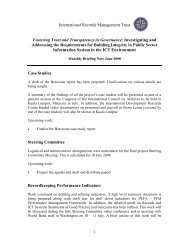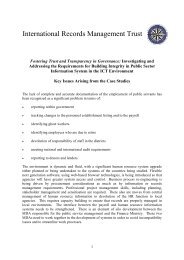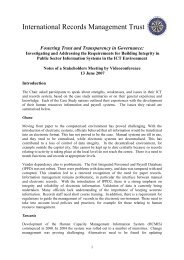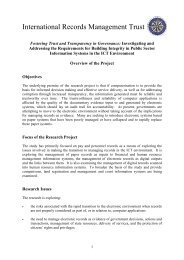managing public sector records: a study programme - International ...
managing public sector records: a study programme - International ...
managing public sector records: a study programme - International ...
Create successful ePaper yourself
Turn your PDF publications into a flip-book with our unique Google optimized e-Paper software.
PROCESS TWO: In the second stage, enactment, draft estimates, are examined by<br />
Parliament and in particular the appropriate select committees. In this stage, the<br />
budget process becomes more <strong>public</strong>. The stage ends with the passing of an<br />
Appropriation Bill. The budget session of Parliament is its most important meeting;<br />
the different aspects of government policy are reviewed and considered.<br />
PROCESS THREE: Implementation is the third stage of the cycle. The Minister of<br />
Finance issues a General Warrant to the Controller and Accountant General, who<br />
directs Treasuries to make payments. On the expenditure side, each <strong>public</strong> agency<br />
now has its working plan as set out in the expenditure estimates. All <strong>public</strong> agencies<br />
play a part in implementation by collecting or spending the <strong>public</strong> funds. The<br />
agencies of the central administration of finance, however, play a larger role and the<br />
<strong>records</strong> created are extensive.<br />
PROCESS FOUR: The fourth phase of the cycle involves assessing performance and<br />
determining variances between <strong>programme</strong> targets and what was actually achieved.<br />
This provides the means of ascertaining areas of success and failure in<br />
implementation of government’s fiscal plans and <strong>programme</strong>s. Described as<br />
accounting, audit and evaluation, this final stage can be summed up as assessing the<br />
government’s overall fiscal accountability.<br />
Accounting <strong>records</strong> are maintained principally for the purposes of control.<br />
Government accounting <strong>records</strong> must be sorted, registered, classified and stored.<br />
Without the support of trained record keeping professionals, standards and<br />
procedures, agency accountants do not manage their <strong>records</strong> effectively. This in turn<br />
affects the preparation of accounting information and financial reporting.<br />
Accounting documents such as vouchers and attachments provide evidence that a<br />
transaction has taken place. A receipt is prepared whenever any sum of money is paid<br />
to any <strong>public</strong> agency and a payment voucher, recording details of the transaction, is<br />
prepared whenever <strong>public</strong> money is disbursed. Financially significant details from<br />
these basic documents are entered into books of accounts, that serve as a means of<br />
registering and locating documents like any register. Because transactions reflect<br />
monetary value, it is also possible to list amounts and derive financially significant<br />
totals according to the way transactions are listed. Thus the process of storing and<br />
indexing financial <strong>records</strong> produces new information, a distillation or summary.<br />
Information needed for accounting purposes is recorded on standard forms. They are<br />
pre-sorted into categories, described as ‘batches’ and entered into vouchers.<br />
Vouchers are stored in bundles and individual documents are located serially. At the<br />
end of the accounting period, all vouchers are securely bound and batch labelled<br />
showing the account title and period covered. The accounting practice of sorting and<br />
then registering has the benefit of allowing various accounting activities to be<br />
processed simultaneously. The registers created provide useful statistics and control<br />
data. An invoice register, for example, will show the number of invoices processed in<br />
any accounting period and their value, providing statistics of work load. This can be


